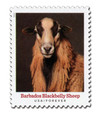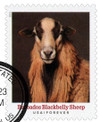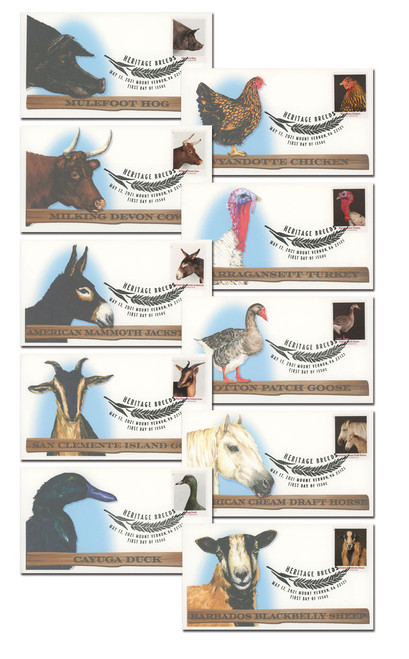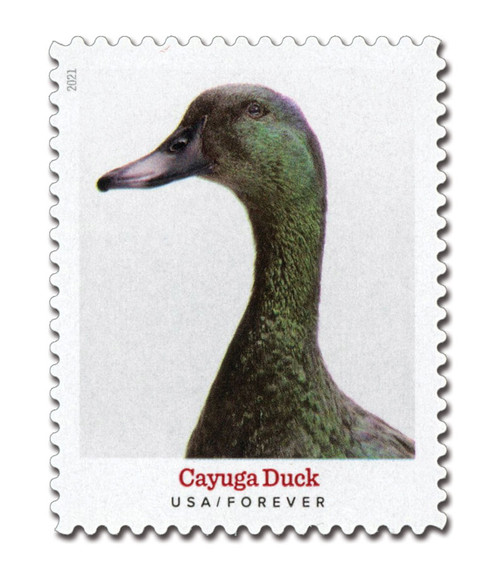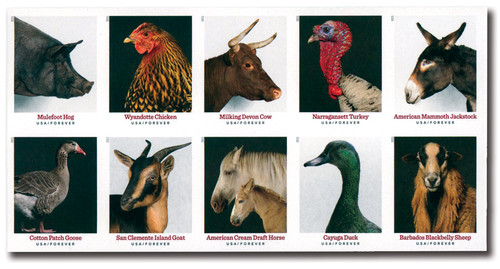
# 5592 - 2021 First-Class Forever Stamp - Heritage Breeds: Blackbelly Sheep
US #5592
2021 Barbados Blackbelly Sheep – Heritage Breeds
- Pictures a Barbados blackbelly sheep
- Part of the set which commemorates 10 different heritage breeds known for their versatility, adaptability, and unique genetics
Stamp Category: Commemorative
Set: Heritage Breeds
Value: 55¢ First Class Mail Rate (Forever)
First Day of Issue: May 17, 2021
First Day City: Mount Vernon, Virginia
Quantity Issued: 25,000,000
Printed by: Banknote Corporation of America
Printing Method: Offset, Flexographic
Format: Panes of 20
Tagging: Phosphor, block tag
Why the stamp was issued: To recognize heritage breeds and their importance in horticulture over the years.
About the stamp designs: Pictures a photograph the heritage breed known as the Barbados blackbelly sheep. Photograph by Aliza Elizarov.
First Day City: The First Day of Issue Ceremony was held in Mount Vernon, Virginia, home of Accokeek Foundation’s Heritage Breed Livestock Conservation Program within the National Colonial Farm at Piscataway Park. The program is home to a herd of milking Devon cows, one of the breeds pictured on the stamps.
About the Heritage Breeds set: These 10 stamps were issued to recognize heritage breeds and their importance to horticulture over the years. The breeds pictured include the mulefoot hog, Wyandotte chicken, milking Devon cow, Narragansett turkey, American mammoth jackstock donkey, cotton patch goose, San Clemente Island goat, American cream draft horse, Cayuga duck, and Barbados blackbelly sheep.
History the stamp represents: The Barbados blackbelly sheep has been around for a very long time – as early as the mid-1600s. It is believed this breed originally came from Africa before evolving on the island of Barbados after it was colonized by Britain in 1627.
The original stock that the Barbados blackbelly sheep came from was established on the island in 1657. The goal was to breed a sheep that would reproduce quickly and without much trouble. It was also necessary to have a sheep that could withstand the warmer climate of Barbados, given sheep’s wool generally suits them for cooler temperatures.
A couple hundred years after the Barbados blackbelly first began being developed, it was introduced to the United States. Four females and one male were brought in by the United States Department of Agriculture in 1904. From then on, there is no record of additional sheep being introduced until the 1970s. Professor Lemuel Goode of North Carolina State University obtained Barbados blackbellies to create a research flock at his university.
Today, the population of Barbados blackbelly sheep is making a comeback in the United States. This is thanks, in large part, to research flocks at universities. It’s great that a breed once on the edge of extinction in the US is in good standing once more.
US #5592
2021 Barbados Blackbelly Sheep – Heritage Breeds
- Pictures a Barbados blackbelly sheep
- Part of the set which commemorates 10 different heritage breeds known for their versatility, adaptability, and unique genetics
Stamp Category: Commemorative
Set: Heritage Breeds
Value: 55¢ First Class Mail Rate (Forever)
First Day of Issue: May 17, 2021
First Day City: Mount Vernon, Virginia
Quantity Issued: 25,000,000
Printed by: Banknote Corporation of America
Printing Method: Offset, Flexographic
Format: Panes of 20
Tagging: Phosphor, block tag
Why the stamp was issued: To recognize heritage breeds and their importance in horticulture over the years.
About the stamp designs: Pictures a photograph the heritage breed known as the Barbados blackbelly sheep. Photograph by Aliza Elizarov.
First Day City: The First Day of Issue Ceremony was held in Mount Vernon, Virginia, home of Accokeek Foundation’s Heritage Breed Livestock Conservation Program within the National Colonial Farm at Piscataway Park. The program is home to a herd of milking Devon cows, one of the breeds pictured on the stamps.
About the Heritage Breeds set: These 10 stamps were issued to recognize heritage breeds and their importance to horticulture over the years. The breeds pictured include the mulefoot hog, Wyandotte chicken, milking Devon cow, Narragansett turkey, American mammoth jackstock donkey, cotton patch goose, San Clemente Island goat, American cream draft horse, Cayuga duck, and Barbados blackbelly sheep.
History the stamp represents: The Barbados blackbelly sheep has been around for a very long time – as early as the mid-1600s. It is believed this breed originally came from Africa before evolving on the island of Barbados after it was colonized by Britain in 1627.
The original stock that the Barbados blackbelly sheep came from was established on the island in 1657. The goal was to breed a sheep that would reproduce quickly and without much trouble. It was also necessary to have a sheep that could withstand the warmer climate of Barbados, given sheep’s wool generally suits them for cooler temperatures.
A couple hundred years after the Barbados blackbelly first began being developed, it was introduced to the United States. Four females and one male were brought in by the United States Department of Agriculture in 1904. From then on, there is no record of additional sheep being introduced until the 1970s. Professor Lemuel Goode of North Carolina State University obtained Barbados blackbellies to create a research flock at his university.
Today, the population of Barbados blackbelly sheep is making a comeback in the United States. This is thanks, in large part, to research flocks at universities. It’s great that a breed once on the edge of extinction in the US is in good standing once more.



